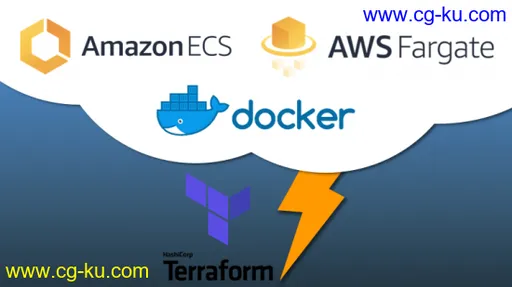h264, yuv420p, 180x270 |ENGLISH, aac, 44100 Hz, 2 channels | 4h 49 mn | 1.93 GB
Created by: Niyazi Erdogan
Learn to work with AWS ECS Fargate, implement complete infrastructure deployment using Terraform with an AWS Architect!
What you'll learn
Learn how to work and code against AWS using Terraform!
Learn how to work with AWS Fargate using Terraform!
Implement ECS Fargate Applications on AWS using Terraform with Infrastructure-as-Code (IaC)!
Learn how to register a domain with Route53 and use with Application Load Balancer for AWS ECS Fargate!
Learn how to create an SSL HTTPS Certificate for your Route53 domain!
Learn to implement 3-Layered Production-Grade Infrastructure for your Applications on AWS using Terraform IaC!
You'll be confident to work with AWS using Terraform for any kind of AWS Resource on VPC and ECS Fargate!
Learn how to Dockerize your Spring Boot Applications
Learn how to create a Dockerfile for your application
Learn how to create a Task Definition for your AWS ECS container application
Learn how to develop end-to-end pipeline with Shell Scripting for application deployment!
Learn how to read and code against an Terraform HCL language!
You'll be able to launch your own infrastructure on AWS without even signing-in to AWS!
Learn the AWS Well-Architected Framework Best-Practices while implementing!
Requirements
An AWS Account - Free Tier Available!
General Knowledge on AWS Model would be nice
Theoretical Knowledge on VPC and ECS Concepts would be nice but not necessary!
Any IDE or even a text-editor, recommend with a Terraform Plugin
Description
Learn to implement production-ready infrastructure with AWS ECS Fargate container platform using Terraform today with an AWS Certified Solutions Architect!
Do you want to implement your complete infrastructure as code? Do you want to learn the coolest and most popular infrastructure configuration management tool on the market, Terraform and make a huge contribution to your skillset?
Then this course is what you need! You will not only learn how to implement Terraform code but also implement an AWS Well-Architected Framework recommended deployment model which will be Highly-Available, Scalable, Fault-Tolerant and Resilient!
In this course, we will start by exploring the tools we need throughout the course. Just to note here too, we will need an IDE with a proper Terraform plugin available. An AWS account is also necessary so I will show you how to get one if you do not already have it. Sure we will set up our environment variables for Terraform deployments and also configure our IDE to use Terraform efficiently by installing a Terraform Plugin which will highlight the syntax and auto-complete everything we intend to do.
In between all these, I will also give you a crash course on Terraform where you will gain all the information you need to implement this infrastructure!
Once we have everything set up, now is time to get our hands dirty and write some Terraform code to implement our cool, shiny architecture!
We will start off with implementing our remote state and obtaining a key pair which we will use to connect to the instances we will launch. Once we get these done, we will first create the Virtual Private Cloud (VPC) environment. To meet the demands of high-availability, we will spread our private and public subnets to three different availability zones inside a region. We will also create our Private and Public Route Tables to manage the routing between our resources inside VPC.
We’ll also make sure to attach an Internet Gateway (IGW) to our VPC to use with public subnets so the resources in those will be able to access and receive public internet traffic. Our private subnet also need some form of internet connection but not both ways; we want only internet access for outgoing connections from our resources in private subnets! To satisfy this requirement, we will launch and attach a NAT Gateway to our private route table.
Now is the time to develop our AWS ECS platform! To start with, we will first register ourselves a domain which we will use for our Spring Boot application. Then we will create an ECS cluster, Target Group, Application Load Balancer, HTTPS Listener and Certificate and IAM roles for ECS cluster to prepare for application deployment.
Next up is to check out the Spring Boot application that we will deploy to AWS ECS Fargate! We will take a quick look and start by implementing our ECS Fargate Task Definition. We will move on to create our IAM Role and Policy, ECS Service, Target Group, Listener Rule and CloudWatch Log Group to finish up with getting ready to deploy our application!
In the next chapter, we will script the whole pipeline of our application from building with Maven to pushing Docker image to AWS Elastic Container Registry (ECR) and then to deploying to AWS ECS Fargate! We will create ourselves a shell-script to implement everything as a different stage and develop the whole pipeline!
Once we're satisfied with the pipeline, we'll start executing our stages one by one! We'll first build the code, build and push our Docker image to AWS ECR and finally we will deploy our Spring Boot application to AWS ECS Fargate to have it up and running with our registered domain!
There are much more to come in this course and I cannot wait for you to come and learn the best practices from an AWS Certified Solutions Architect!
Who this course is for:
Who wants to learn AWS ECS Fargate; one of the best container environments out there!
Who wants to design and develop AWS ECS Fargate deployment from zero-to-hero using Terraform!
Who wants to learn how to implement Infrastructure-as-a-Code (IaaS) with Terraform on AWS
Who wants to learn Terraform, infrastructure configuration language from Terraform
Who wants to learn how to launch Virtual Private Clouds, Public-Private Subnets and more with Terraform code on AWS
Who wants to learn and launch Highly-Available, Scalable, Fault-Tolerant and Resilient architectures on AWS!
Beginners on AWS who wants to put their theory in practice


发布日期: 2020-03-26